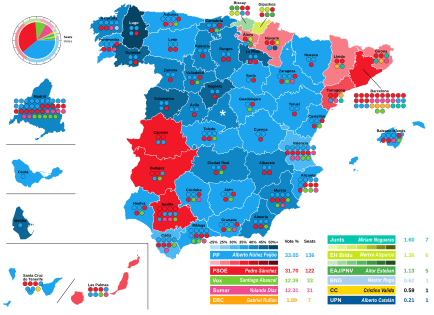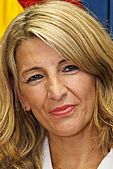2023 Spanish general election facts for kids
|
|||||||||||||||||||||||||||||||||||||||||||||||||||||||||||||||||||||||||||||||||||||||||||||
|
|
|||||||||||||||||||||||||||||||||||||||||||||||||||||||||||||||||||||||||||||||||||||||||||||
|
All 350 seats in the Congress of Deputies and 208 (of 266) seats in the Senate 176 seats needed for a majority in the Congress of Deputies |
|||||||||||||||||||||||||||||||||||||||||||||||||||||||||||||||||||||||||||||||||||||||||||||
|---|---|---|---|---|---|---|---|---|---|---|---|---|---|---|---|---|---|---|---|---|---|---|---|---|---|---|---|---|---|---|---|---|---|---|---|---|---|---|---|---|---|---|---|---|---|---|---|---|---|---|---|---|---|---|---|---|---|---|---|---|---|---|---|---|---|---|---|---|---|---|---|---|---|---|---|---|---|---|---|---|---|---|---|---|---|---|---|---|---|---|---|---|---|
| Opinion polls | |||||||||||||||||||||||||||||||||||||||||||||||||||||||||||||||||||||||||||||||||||||||||||||
| Registered | 37,466,432 |
||||||||||||||||||||||||||||||||||||||||||||||||||||||||||||||||||||||||||||||||||||||||||||
| Turnout | 24,743,612 (66.0%) |
||||||||||||||||||||||||||||||||||||||||||||||||||||||||||||||||||||||||||||||||||||||||||||
|
|||||||||||||||||||||||||||||||||||||||||||||||||||||||||||||||||||||||||||||||||||||||||||||

Election results by Congress of Deputies constituency
|
|||||||||||||||||||||||||||||||||||||||||||||||||||||||||||||||||||||||||||||||||||||||||||||
|
|||||||||||||||||||||||||||||||||||||||||||||||||||||||||||||||||||||||||||||||||||||||||||||
The 2023 Spanish general election was a big vote held on Sunday, July 23, 2023, in Spain. People voted to choose new members for the Cortes Generales, which is like Spain's parliament. They elected all 350 members for the Congress of Deputies and 208 members for the Senate.
Before this election, the government was led by Pedro Sánchez. His government was a team-up between the Spanish Socialist Workers' Party (PSOE) and Unidas Podemos. This was Spain's first government of this kind in a long time. Their time in power was greatly affected by the COVID-19 pandemic starting in 2020.
On the other side, the People's Party (PP) got a new leader, Alberto Núñez Feijóo, in 2022. After he took over, the PP started doing very well in public opinion polls. They also won many local and regional elections in May 2023. Another party, Vox, said they would support the PP if they needed help to form a government.
Even though many thought the election might happen earlier, Prime Minister Pedro Sánchez had planned for it to be in December 2023. However, after his party did not do well in the May 2023 local elections, he decided to call for an early election. This was a surprise move to catch the other parties off guard.
In the election, the PP won the most seats, getting 136 in the Congress. The PSOE came in second place, doing better than many expected. Vox lost some seats, and a new group called Sumar also won fewer seats than its parts had before. No single group won enough seats to form a government on their own. This means they had to work with smaller regional parties to create a new government.
Contents
How Elections Work in Spain
Understanding the Parliament
Spain's parliament, the Cortes Generales, has two main parts: the Congress of Deputies and the Senate. The Congress of Deputies has more power. It can choose the prime minister and pass laws. The Senate also has important roles, but the Congress can often overrule its decisions.
Everyone in Spain who is 18 or older can vote. A new rule in 2022 made it easier for Spaniards abroad to vote. Before, they had to apply specially, which made fewer people vote from other countries.
Voting for the Congress of Deputies
For the Congress of Deputies, 348 seats are chosen using a system called the D'Hondt method. This system makes sure that parties get seats based on how many votes they receive. To win seats, a party needs at least three percent of the votes in each area.
The seats are divided among Spain's provinces. Each province gets at least two seats. The remaining seats are given out based on how many people live in each province. The cities of Ceuta and Melilla each get two seats, chosen by who gets the most votes.
Voting for the Senate
For the Senate, 208 seats are chosen differently. Voters pick individual candidates, not just parties. In areas with four seats, you can vote for up to three candidates. In areas with two or three seats, you can vote for up to two. In areas with only one seat, you vote for one candidate.
Each of Spain's 47 mainland provinces gets four Senate seats. Islands like Majorca, Gran Canaria, and Tenerife get three seats each. Smaller islands get one seat each. Ceuta and Melilla each elect two senators. Also, Spain's regions can choose extra senators based on their population.
What Happened After the Election
There were over 37 million people who could vote in this election. The results showed that the PP won about 33.1 percent of the votes and 136 seats. The PSOE got 31.7 percent of the votes and 122 seats. Vox won 33 seats, which was 19 fewer than they had before. Sumar won 31 seats. News reports said that the PSOE did better than expected.
During the election campaign, many news groups thought that if the PP won, they would need help from Vox to get enough seats to form a government. The PP leader, Feijóo, said he would rather try to lead a government without a clear majority. However, after the election, the PP and Vox together did not have enough seats to form a majority. Both the PP and PSOE said they had won. Some news outlets suggested that Spain might need another election soon because neither side had a clear majority.
The Catalan party Junts became very important after the election. Since neither the left-wing nor right-wing parties had enough seats, they needed Junts's votes or their decision to not vote (abstain) to form a government. Junts is a party that wants Catalonia to be independent from Spain. They don't usually support the main Spanish parties. The spokeswoman for Junts, Míriam Nogueras, said that her party was not there to help Spain's government, but to help Catalonia become independent. She also said that her party would not give their support for free.
On July 24, the Canarian Coalition party said they would not support Feijóo as prime minister. The president of the Basque Nationalist Party also said the same thing.
See also
 In Spanish: Elecciones generales de España de 2023 para niños
In Spanish: Elecciones generales de España de 2023 para niños
 | James B. Knighten |
 | Azellia White |
 | Willa Brown |







